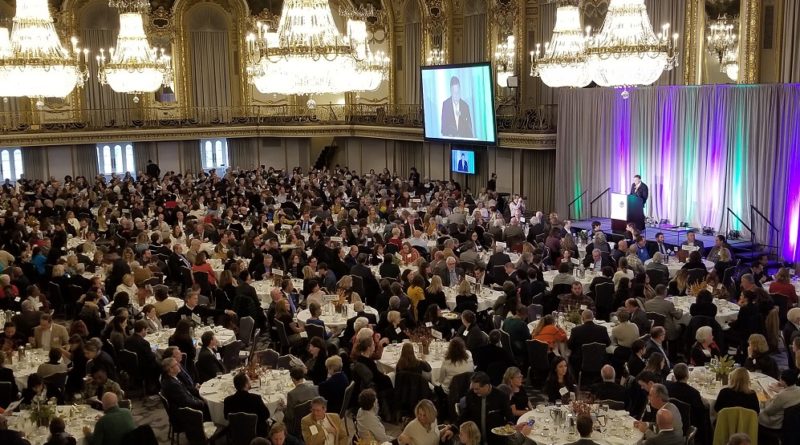Green Infrastructure Means Green Jobs
Podcast: Play in new window | Download (Duration: 1:33:14 — 43.7MB)
Subscribe: Apple Podcasts | Spotify | Android | iHeartRadio | Podchaser | Email | TuneIn | RSS | More
(January 12, 2020) One of the things I love about the Openlands annual luncheon (above photo) is the schmoozing. A thousand environmentalists are gathered under one roof at the end of October and they talk enviro-biz to each other until they are chased out of the room by the wait staff. Last year, it happened on Halloween. There was a snowstorm outside, but inside, I was at a table with Daniella Pereira, Vice President of Community Conservation at Openlands. I told her that she should be on my radio show. She said that we should talk about green infrastructure and jobs. I said yes. Boom, done.
Actually, I have wanted to talk to Daniella on the show for several years, since she was working with the TreeKeepers program. TreeKeepers work throughout the region to keep trees healthy. They plant and mulch and prune and generally care for trees. Since 1991, about 2,000 trained volunteers have graduated from TreeKeeper classes. I am, in fact, TreeKeeper #417.
This spring’s training is being held at the Peggy Notebaert Nature Museum from March 29 to April 29. You can register here.
Here are some other subjects we will discuss this morning.
Green Infrastructure Workforce – A group called Jobs for the Future (JFF) put out a report in 2017 called Exploring the Green Infrastructure Workforce.
Studies have documented the economic and other public benefits of green infrastructure.1 But until now there has been little examination of the workforce needed to install and maintain green infrastructure systems. There is particular interest in understanding the potential to provide employment opportunities for low-income residents and other underserved populations of urban areas.
How many people work in green infrastructure? What are the jobs? What level of compensation do they offer?
What are the educational requirements? How much potential is there for job creation as green infrastructure
investments increase?
Green Stormwater Infrastructure – GSI is a subset of GI (Green Infrastructure). This is from a report by the National Recreation and Park Association.
While green stormwater infrastructure is not a new practice, cities and towns do not commonly apply these solutions as much as they do traditional grey infrastructure (e.g., pipes, pumps, ditches and detention ponds) for stormwater management. While park and recreation leaders have some familiarity with GSI and its potential benefits, most indicate that GSI investments are not common at their agencies.
Space to Grow – This program is a collaboration among Healthy Schools Campaign, Openlands, Chicago Public Schools, the Chicago Department of Water Management and the Metropolitan Water Reclamation District of Greater Chicago.
Space to Grow transforms Chicago schoolyards into beautiful and functional spaces to play, learn, garden and be outside. The schoolyards also use special design elements to help reduce neighborhood flooding.
Schoolyard transformations prioritize physical activity, outdoor learning and community engagement. The green schoolyards incorporate landscape features that capture a significant amount of rainfall, helping keep the city’s water resources clean and resulting in less neighborhood flooding.
Chicago Tree Trimming – Speaking of reports, in October, 2019, the City of Chicago Office of Inspector General sent a letter to Tom Tully, Commissioner of the Chicago Department of Streets and Sanitation. It was titled, “Advisory Concerning DSS Inefficient Tree Trimming Operations.” Here’s a sample of the letter.
Before the advent of 311 in 1999, DSS used a grid-based approach, which involved dispatching crews to trim all the trees in grid-sized sections of the City. This systematic approach allowed DSS to trim City trees on a five-year, rotating schedule. DSS currently trims City trees using a reactive, 311 request-based approach. Accordingly, the City relies on residents’ calls to 311 to identify trees in need of trimming, rather than using a systematically proactive, arboriculturally based approach. When residents want a tree in their area trimmed, they call 311, their request is logged, and, if the request does not involve an emergency, DSS handles the request in the order it was received. Since DSS crews must travel throughout the City to handle individual 311 requests, they spend more time traveling and fewer City trees are trimmed. In addition, since some area residents do not regularly call 311 to request tree trims, many City trees have not been trimmed in over 10 years.
Ouch. By the way, here’s the response from Commissioner Tully. Who knows what else we’ll talk about? You’ll have to tune in.
MLK Food Justice and Sustainability Weekend
 If it’s early January, it must be time to talk to Robert Nevel from KAM Isaiah Israel about their annual MLK Food Justice and Sustainability Weekend. This is the eleventh year for the event, featuring workshops by leading growers, environmentalists, scientists, and social justice activists. The goal of the weekend is to provide participants with powerful tools for change and a heightened motivation to work toward a greener, more equitable and sustainable world. And, once again, as he has done for almost all eleven years, Robert joins us on the show.
If it’s early January, it must be time to talk to Robert Nevel from KAM Isaiah Israel about their annual MLK Food Justice and Sustainability Weekend. This is the eleventh year for the event, featuring workshops by leading growers, environmentalists, scientists, and social justice activists. The goal of the weekend is to provide participants with powerful tools for change and a heightened motivation to work toward a greener, more equitable and sustainable world. And, once again, as he has done for almost all eleven years, Robert joins us on the show.
All events are free of charge and open to the public and are presented at KAM Isaiah Israel, 1100 E. Hyde Park Boulevard Chicago, Illinois 60615.
There is a full slate of seminars and workshops on Sunday morning and afternoon. But Saturday, as usual, features a Community Design Workshop, starting at 4pm. This year, it’s called “Transforming a 470 Acre Former Industrial Site Into A Public Food Forest.” A group of soil, gardening and environmental experts will look at the former U.S. Steel South Works site, which now sits abandoned. Could it be a home for a food forest? What about soil contamination?
Andrew Margenot, Assistant Professor of Soil Science, Crop Sciences Department, University of Illinois Urbana-Champaign, joins us with some of the answers, and perhaps even more questions.
Taking Back Our Health and the Health of the Planet
Sundays on WCGO are about to get even more interesting starting this week, as the folks here are adding another one-of-a-kind “lifestyle” show to the Smart Talk weekend line-up. Back in November, Hannah, Fred and Justin joined us in the studio to talk about their show, Gabby Road, which airs from 11am-1pm, right after we get out of the studio. While they’re broadcasting, we usually bump into Bill and Kerri in the WCGO halls, as they get ready for Chicago’s only live radio program dedicated to the arts, Playtime with Bill Turck and Kerri Kendall, starting at 1pm.
 So today, the nation’s first live, mainstream radio program dedicated to a plant-based lifestyle debuts from 3-4pm CT on WCGO, and it’s hosted by Elysabeth Alfano. She’s a radio and media veteran herself, with more than nine years in radio, TV, podcasting and print journalism here in Chicago at places like WGN and WLS, WCPT and across the country. Elysabeth also hosts the Awesome Vegans Podcast and Blog, and often appears as a plant-based news, food and lifestyle expert on major market radio stations, podcasts and websites. She’s also a public speaker and coach, creates plant-based recipes for restaurants and food companies, teaches plant-based courses and hosts an online cooking series on her website.
So today, the nation’s first live, mainstream radio program dedicated to a plant-based lifestyle debuts from 3-4pm CT on WCGO, and it’s hosted by Elysabeth Alfano. She’s a radio and media veteran herself, with more than nine years in radio, TV, podcasting and print journalism here in Chicago at places like WGN and WLS, WCPT and across the country. Elysabeth also hosts the Awesome Vegans Podcast and Blog, and often appears as a plant-based news, food and lifestyle expert on major market radio stations, podcasts and websites. She’s also a public speaker and coach, creates plant-based recipes for restaurants and food companies, teaches plant-based courses and hosts an online cooking series on her website.
According to the show’s press release:
“With more and more plant-based products hitting the market and more people turning to a plant-based diet for their health and for the health of the planet, the timing couldn’t be more perfect and the content couldn’t be more in demand,” Alfano notes.
The Elysabeth Alfano Show will open with breaking news (business, health, environment, celebrity), feature in-depth interviews with the leaders in the plant-based arena (doctors, entrepreneurs, celebrities, politicians, scientists, athletes, authors) and wrap with recipe and lifestyle tips. The tagline for the show is “Taking Back Our Health and the Health of the Planet.”
Elysabeth takes a break from show prep to join us via the Skype-machine (or maybe it’s the Zoom-machine) on this morning’s show and discuss what listeners can expect to learn on her new program. We’ll get a chance to ask her about some of the organic food and environmental connections to plant-based eating as well, just before Rick DiMaio joins us by phone from Boston, where he’s attending the 100th annual meeting of the American Meteorological Society.

